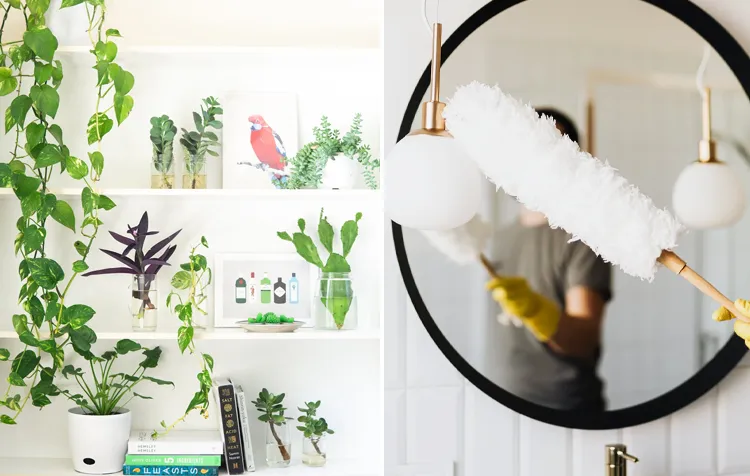How to improve the indoor climate? If you are looking for useful tips for healthy living and better indoor air, you have come to the right place! For sure you know the nice feeling of entering a room and immediately feel comfortable. This is usually the case, for example, when the temperature is pleasant and the air is fresh.
The interplay of these and several other factors that have a significant influence on health and well-being in enclosed spaces is known as the indoor climate. When it is bad, we often don't feel good either. Fortunately, there are countless ways to specifically improve the indoor climate and provide a real feel-good atmosphere.
In this article I would like to give you the best tips for healthier living and a truly optimal indoor climate in your home. In addition, you will learn about the main advantages and decisive factors beforehand. Let's go!
Here you can find a short overview in advance:
Advantages: Why is a good indoor climate important?

Indoor climate... all well and good! But why exactly should you actually bother to improve it? Let's answer this question clearly first, so that you can also have a Long-term motivation have to provide a feel-good atmosphere.
Here are some of the top reasons to pay attention to a healthy indoor environment:
- Protect health: A balanced indoor climate can help to remedy health problems such as headaches, fatigue or dry eyes. Asthma and allergies (e.g. in reaction to mold) can also be alleviated by better air quality.
- Increase well-beingIf the indoor climate is exactly the way you want it, then you will feel completely comfortable, relaxed and truly at home within your own four walls. Not least because a healthy indoor climate of the helps to sleep better.
- Increase concentration: A high air quality and comfortable room temperatures take positive influence on your concentration and increase your productivity. An optimal room climate is therefore particularly important and beneficial in working and learning environments.
- Avoid mold: Regular ventilation and a balanced humidity level help, among other things, to prevent mold growth and other long-term structural damage.
- Promote climate protection: Around 73 percent of an average household's energy consumption is attributable to heating.₁ By heating and ventilating efficiently - and optimally regulating the room temperature - you can save a lot of Save energy and thus protect the world's climate, as well as your wallet.
Factors: What influences the indoor climate - and when is it optimal?
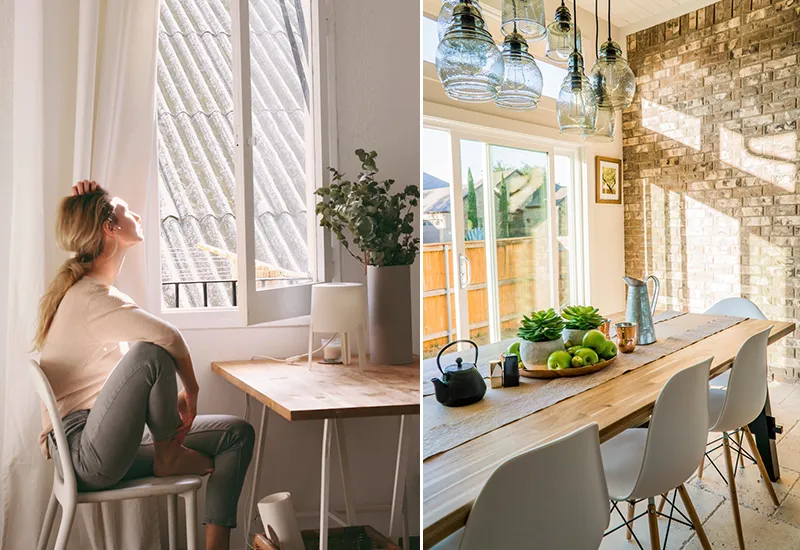
In the next step, it is now important to keep an eye on the things that decide the quality of indoor air and climate in a room. That's why I would now like to introduce you to exactly those factors which in interaction have a decisive influence on the (optimal) indoor climate have. They serve to derive useful tips for improving the air in your rooms.
If you take the following factors into account in your project and improve them, you will eventually be able to Benefit from a more pleasant and healthier living environment.
- Temperature: An average room temperature of around 20°C is recommended.
- Humidity: A humidity of 40-60 percent is considered healthy.
- Air quality: Experts:inside generally recommend an air exchange rate of at least 0.5 1/h. This means that half the room volume should be exchanged within one hour.
These three key factors (temperature, humidity and air quality) can be wonderfully with such a digital thermo hygrometer* measure and optimize them in a targeted manner. In this way, you also automatically learn how practical measures affect the indoor climate.
More difficult to measure, but nevertheless also relevant for healthy living, are also the Lighting, the Noise level, the Establishment and last but not least the Interior design.
Notice: I have tried here to give you approximate guidelines for the best possible room climate. However, keep in mind that everyone has individual needs, preferences and not least ideas about when one feels comfortable in a room. For example, some people sweat quickly and prefer to sleep with the window open in cool air. Someone else, on the other hand, already freezes on cool summer evenings and is rather close to turning up the heating.
10 tips: What can you do to improve indoor air?
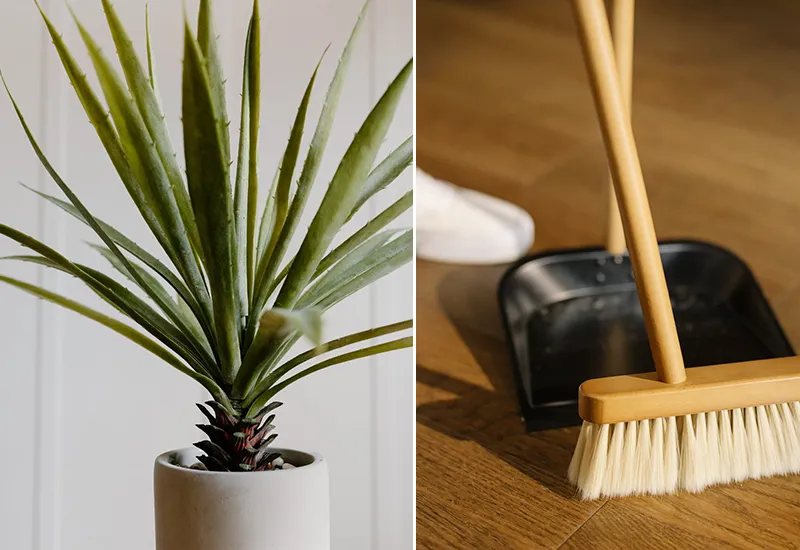
Now you have learned the essential factors for better indoor air. However, the all-important question is still open: What can be done practically in everyday life at home to improve the living environment?
Here I present you the most important tips, ideas and advice to steadily approach the optimal air condition of your rooms.
1. ventilate rooms regularly
It's incredibly important that you keep letting oxygenated, drier, fresh air into your indoor spaces. Through the Shock ventilation (several times a day for 10 minutes) of all rooms, stale and humid room air is exchanged. Make sure there is a draft so that the fresh air can circulate faster.
By regularly changing the air in this way, you can easily prevent, among other things, the following Mold or also Respiratory problems as a result of a poor indoor climate.
2. rely on modern technologies
Perhaps you own your own home or wish to do so in the future. Both in new construction, as well as through a modernization of an existing building, you can lay the foundation for an optimal indoor climate and healthy living with state-subsidized technical aids.
One central ventilation system for example, ensures a continuous supply of fresh air - throughout the house. If efficient heat recovery is possible, it can even use the heat from the exhaust air to transfer it to the supply air and save large amounts of energy.
For example, when planning, orient yourself to the requirements of the KfW funding for house construction with QNG, i.e. for residential buildings with Certification according to the Sustainable Building Quality Seal - and benefit from financial subsidies.
Tip: Either way, always make sure that the heating is optimally adjusted and have it regularly checked and serviced by a professional. This can also be a decisive factor for the indoor climate in your home.
3. remove dirt and house dust regularly
House dust and dirt significantly affect the quality of indoor air and can also cause allergies or respiratory problems.
To keep as few of the tiny dust particles flying around your rooms as possible, the Regular vacuuming and wiping more than appropriate. Especially carpets and upholstered furniture need to be cleaned regularly, because they are real dust catchers that cannot be simply wiped off.
4. prefer air-purifying houseplants
Houseplants are visual highlights, but above all they are also natural air purifiers, as they absorb carbon dioxide and release oxygen. Some plant species can even filter pollutants (such as formaldehyde and benzene) from the air.₂
So choose The right plants out that improve both the indoor air, as well as the ambience of the home. Here are some examples of air-purifying plants:
- Aloe vera
- Ivy
- Monocle
- Rubber tree
- Green Lily
- Birch fig
- Dragon tree
- Dieffenbachia
- Sword fern
- …
But please remember to not to water too often and only with the amounts they really need. Also in this way you can avoid too high humidity and prevent, among other things, mold growth.
Can you think of other houseplants that are good for the indoor climate? Then I look forward to your comment under this article.
5. prefer natural furniture and furnishings.
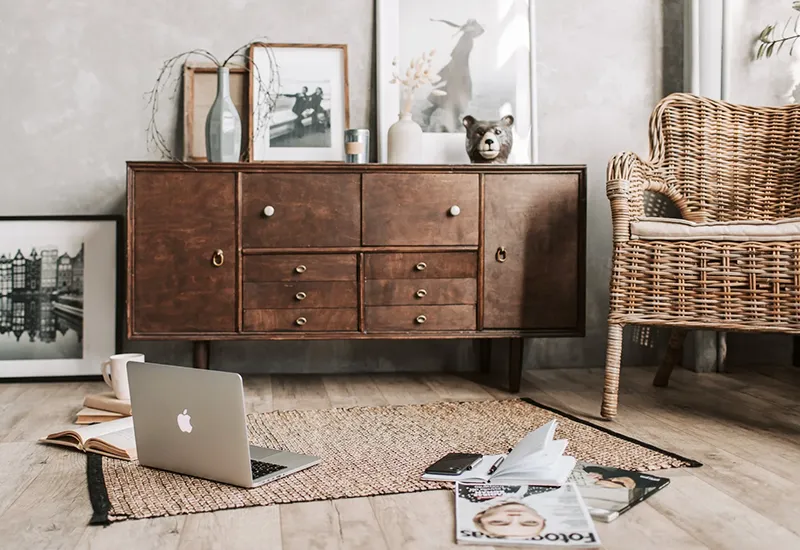
When we talk about home health, one cannot avoid mentioning furniture and fixtures. Low-pollutant and low-emission, natural materials (e.g. wood, reed or cork) play an important role for the air quality in your own four walls.
Furthermore, also the Furniture positioning Influence the room climate, for example, by restricting air circulation or blocking the heat of the heater. Therefore, do not place them in front of a radiator and, if possible, place them so that there is still a few meters distance to the other walls where they are not located.
Tip: Look with pleasure times in my DIY Furniture Blog in. There I show you, for example, how you can make a Building dining table from old oak planks simply by following your heart.
6. regulate room temperature
Of course, the room temperature plays a big role in how comfortable you feel in a room. It should be neither too hot nor too cold if you want to improve the indoor climate.
In general, as already mentioned, a average room temperature of around 20°C recommended. For the individual interiors However, there are also gradations in the recommendations:
- Bedroom: 16-20°C
- Bathroom: 21-23°C
- Living room, dining room and study: 20-23°C
- Kitchen: 18-20°C
In the end, however, the personal temperature sensation and certainly also the respective Season decisive for which values are comfortable for you.
7. avoid unpleasant odors and chemical fragrances
From Cigarette smoke to the stench from the organic waste garbage can - course, these unpleasant odors are to prevent, as they have a great impact on the well-being in a room. But this does not always work out! Therefore, it is important to ensure the most ideal air circulation possible and to provide a regular supply of fresh air.
In addition, those who want to create a healthy living environment should also avoid scented candles, air fresheners and synthetic perfumes with chemical substances, as they can affect air quality and also cause health problems. It is better to rely on Natural alternatives such as essential oils or DIY room sprays with natural ingredients. to fall back on.
Tip: How you Stop smoking immediately you can learn in the linked blog post! Alternatively, you can also use the article about the Advantages of quitting smoking.
8. use humidifiers, dehumidifiers and air purifiers.
Air that is too dry, for example, can lead to irritated mucous membranes - especially in winter with the dry heating air. Humid air, in turn, can quickly lead to mold. In such moments, humidifiers or dehumidifiers help you to keep the Maintain optimum humidity of 40-60 percent on average..
Even with the humidity considered ideal, there are again slight differences between the premiseswhich I do not want to conceal from you:
- Bedroom: 40-60 %
- Bathroom: 50-70 %
- Living room, dining room and study: 40-60 %
- Kitchen: 50-60 %
Furthermore, air purifiers support you in this, Pollutants, pollen, animal hair or even bacteria from the indoor air and thus significantly increase the air quality.
Tip: If possible, please dry your laundry in the fresh air on the balcony, in the garden or on the terrace to avoid excessive humidity and mold growth indoors.
9. use natural detergents
To prevent indoor air pollution and provide a healthy living environment, it is also advisable to use the following methods during the Cleaning as waste-free as possible to refrain from using agents containing aggressive chemicals and pollutants that are hazardous to health.
Instead, you should rely on natural cleaning agents. With time-tested home remedies and homemade cleaners from vinegar, soda, baking soda and citric acid. you can not only improve the indoor climate, but also through your sustainable behavior save money.
10. provide adequate lighting and silence
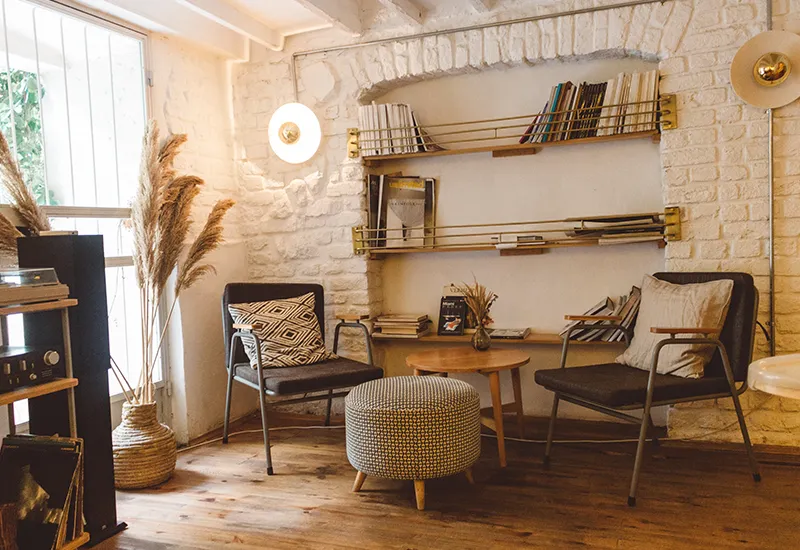
Also the Light, the wall colors and the soundscape influence our mood and should receive attention from you if you want to lay the foundation for a good indoor climate.
It is generally advisable for As much natural light as possible through windows instead of illuminating rooms with harsh, flickering artificial light sources. So feel free to let the sun's rays in if you want to improve your room's atmosphere.
Important for the well-being and bright rooms are, of course, also light, natural colors on the walls. On the other hand, walls that are too dark tend to have a stressful effect on many people - and also reflect less natural light.
In addition, I would like to conclude Sounds in a room not go unmentioned, because they also influence how comfortable you feel. For example, the humming refrigerator, the ticking wall clock or passing cars can also have a significant influence on the indoor climate.
Therefore, exhaust all possibilities to provide natural lighting and relaxing tranquility.
Improve indoor climate, made easy!
A pleasant indoor climate can not only increase your general well-being, but also positive influence on your health, productivity and sleep quality take. These motifs alone are worth targeting to optimize the air in your house or apartment, don't you think?
"To whom health is near and dear, must mobilize what is possible to spend his time outdoors in fresh air."
Sebastian Kneipp (more at Air Quotes)
Your home should be a place where you feel comfortable and healthy. Please be aware that every small step along the way can make a big difference.
I really hope that I could help you with my tips. Do you have any questions, suggestions or further ideas to improve the indoor climate? Then I look forward to your comment.
Stay healthy,

PS: Indoor air quality is not the only important factor. The Environmental problem of air pollution is probably the far greater threat to our health. Everything you need to know about it - and what you can do yourself against air pollution you'll learn next in the linked blog articles.
References:
₁ Federal Environment Agency: Richtig heizen (as of 07.10.2021), available at https://www.umweltbundesamt.de/themen/richtig-heizen. [09.07.2023].
₂ NASA Spinoff (2007): Plants Clean Air and Water for Indoor Environments, available at https://spinoff.nasa.gov/Spinoff2007/ps_3.html. [09.07.2023].

